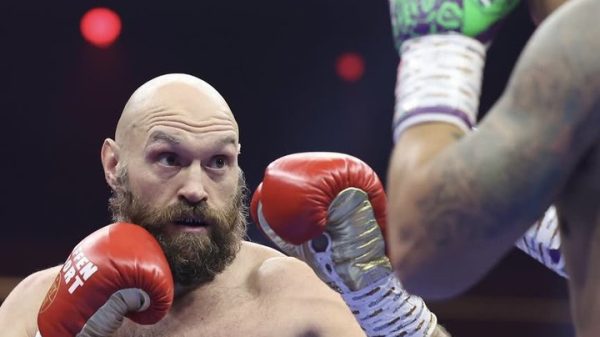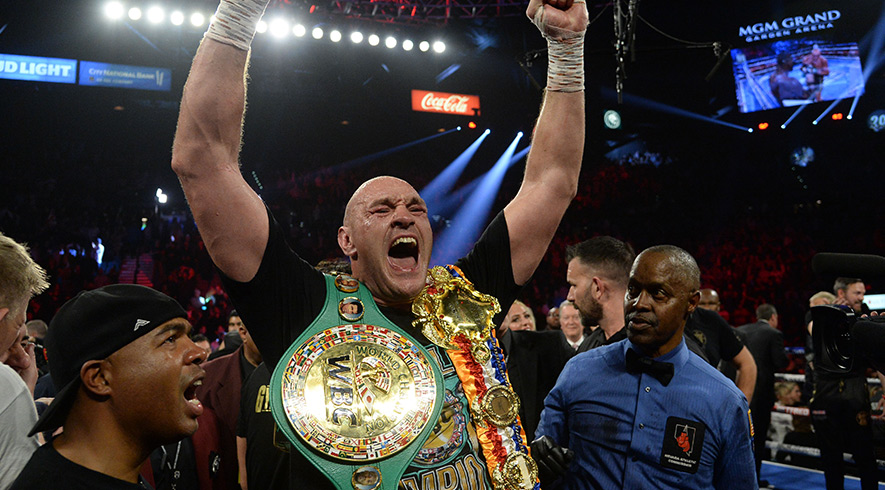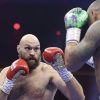By Sean Crose
Controversy is known to go with boxing like gloves go with fighters. Still, events like this past Saturday’s Brandon Rios-Diego Chaves bout undoubtedly leave a bitter taste in fan’s mouths. Boxing matches, after all, are supposed to be settled by boxers, not by referees. Yet referee Vic Drakulich decided to stop the very exciting Rios-Chaves fight himself on Saturday, a move which presented the boxing world with yet another dubious ending.

Photo: Chris Farina/Top Rank
The fight had been a dirty one, to be sure, an extremely dirty one. These weren’t scientific boxers plying their trade. These were out and out brawlers getting it on like the ring was simply a stand in for the parking lot of a bar. No referee would have had an easy time dealing with Chaves and Rios, that’s for sure.
One has to wonder, though, how many refs would have insisted on inserting themselves into the fight the way Drakulich did. For the man made it clear rather early on in the match that he would not hesitate to take points away from both fighters. And take points away he did, on numerous occasions. One longtime fan commented that Drakulich simply looked like a man who couldn’t control his fighters and therefore overreacted, the way overwhelmed authority figures sometimes do.
That may well be true. It’s worth giving Drakulich a closer look, however, before the fight world in general arrives at such a conclusion. According to the reliable site BoxRec, Drakulich is the son of a Serbian father and an Italian mother. He was an excellent student as a youth, as well as an athlete of note. At present, the man can be found practicing law in Nevada when he’s not refereeing fights.
Oh, and he’s officiated over 450 boxing matches. In fact, the exact number is 460. That’s 460 pro fights in a career that started way back on March 3d, 1989. Besides being named ref of the year in 2010 by the WBC, Drakulich can also boast about having reffed bouts for virtually every famous fighter from the past 20 years not named Tyson, Mayweather or Holyfield.
Indeed, a scan of the bouts Drakulich has worked offers up a who’s who of modern boxing notables. Manny Pacquiao. Lennox Lewis. Juan Manuel Marquez. Amir Khan. Roy Jones Jr. Timothy Bradley. Oscar De La Hoya. The list goes on and on. Some of these men, like Pacquiao, have even allowed Drakulich to oversee their bouts on numerous occasions.
Why then, did this exceedingly experienced pro find himself entangled in such a mire last Saturday night? In all 459 bouts the man had officiated over before this past weekend, he had only felt the need to disqualify a boxer on two occasions. That’s less than 0.5% of all the bouts Drakulich had worked over the years. In other words, the man certainly never came across as a control freak – at least not on paper.
The truth is that the world will never know the answer to why things worked out the way they did for Rios and Chaves in Vegas. Perhaps Drakulich had an off night. Perhaps the longtime fan was right and Drakulich was overwhelmed by the personalities involved. Perhaps Drakulich was even somewhat justified in making the call he did (only he truly knows what it was like trying to keep both wily fighters in line, after all).
None of it really matters, though, when one steps back and looks at the whole affair with some objectivity. What matters, really, is the optics. And the optics on Saturday where just horrendous. Once again, the sport of boxing ended up with a black eye. There’s just no way to sugar coat it. The outcome looked bad. It was unsatisfying and, what’s worse, possibly quite unfair.
Deservedly or not, Vic Drakulich has become boxing’s newest and latest poster boy for controversy.








drover sointeru
11/04/2024 at 8:46 am
I’ve been surfing on-line greater than 3 hours as of late, yet I never found any fascinating article like yours. It’s lovely value sufficient for me. Personally, if all web owners and bloggers made good content material as you probably did, the net might be much more useful than ever before. “No one has the right to destroy another person’s belief by demanding empirical evidence.” by Ann Landers.